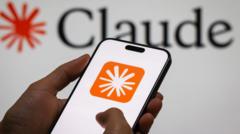Can AI Firms Use Copyrighted Books Without Consequences?

A Landmark Ruling on AI Training and Copyright Law
The recent ruling by a US judge regarding the use of books to train artificial intelligence (AI) software has opened a significant dialogue on the intersection of technology and intellectual property rights. Judge William Alsup's decision concerning AI firm Anthropic has not only underscored the complexities of copyright law but also set a precedent for how AI companies can utilize existing works to develop their models. This article dives deep into the implications of this ruling, the arguments presented, and its potential impact on the future of AI development and copyright law.
The Background of the Case
In 2022, a lawsuit was filed against Anthropic by three authors: novelist Andrea Bartz, and non-fiction writers Charles Graeber and Kirk Wallace Johnson. They accused the company of using their works to train its Claude AI model without permission, which they claimed constituted copyright infringement. The authors sought redress for what they termed the "stealing" of their creative output to build a business valued in the billions. The stakes were high, with the potential for damages reaching $150,000 per copyrighted work.
The Plaintiffs: Who Are They?
- Andrea Bartz: A best-selling author known for her thriller novels, including "We Were Never Here" and "The Last Ferry Out."
- Charles Graeber: A respected non-fiction writer whose works delve into medical and investigative topics.
- Kirk Wallace Johnson: An acclaimed non-fiction author recognized for his narratives that explore the intersection of human experience and broader themes.
Understanding the Claims
The authors argued that Anthropic's use of their writings to train AI models was not only unauthorized but also harmful to their intellectual property rights. They contended that by utilizing their texts, Anthropic was creating a competitive advantage without compensating the rightful creators. The lawsuit highlights a growing concern among authors and content creators regarding the potential for AI to undermine their livelihoods.
The Court's Analysis
Judge William Alsup’s ruling was notable for its nuanced approach to the concept of "transformative use," a central tenet of US copyright law. In his decision, Judge Alsup noted that the use of the authors’ works was "exceedingly transformative." He recognized that Anthropic's AI models aimed to create novel outputs rather than simply replicate existing works.
What is Transformative Use?
Transformative use refers to a legal doctrine allowing the use of copyrighted material without permission if the new work adds something new, alters the original with new expression, meaning, or message. In this context, the judge’s acknowledgment of transformative use implies that AI models trained on existing texts can potentially create new content that does not infringe on the original copyright.
Key Points from Judge Alsup's Ruling
- The training of AI models was characterized as a transformative use of the authors' works. - The authors did not demonstrate that the AI's training led to the creation of direct copies or "infringing knockoffs" of their original writings. - The court recognized the potential for AI to generate new and diverse outputs that do not simply replicate the original works.The Implications for AI Companies
This ruling sets a crucial precedent for AI companies navigating the legal landscape surrounding copyright law. It signals that while transformative use may provide some leeway for AI training on existing works, companies must still tread carefully regarding how they source their training materials.
Potential Consequences for Anthropic
Despite the court's acknowledgment of transformative use, Anthropic faces a significant challenge ahead. The ruling mandates that the company must stand trial regarding the nature of its "central library," which reportedly contains over seven million pirated books. This aspect of the case could have serious ramifications for Anthropic, particularly if the court finds that the company’s actions constitute copyright infringement.
Broader Context: AI and Copyright Law
This ruling is not an isolated incident. The AI industry has been at the forefront of legal battles concerning copyright infringement across various media, including music, journalism, and visual art. The legal landscape is rapidly evolving, and the outcomes of these cases will play a critical role in shaping how AI companies operate in the future.
Other Notable Legal Battles
- **Disney and Universal vs. Midjourney:** These entertainment giants have filed a lawsuit against the AI image generator, accusing it of piracy and unauthorized use of their content. - **BBC's Legal Considerations:** The BBC is reportedly exploring legal actions regarding the unauthorized use of its content in AI training, highlighting the concern shared by many creators.The Future of AI and Copyright
As technology continues to advance, the relationship between AI and copyright law will likely become even more intricate. The ruling in favor of transformative use may encourage AI firms to innovate while also pushing them to establish clearer guidelines regarding the sourcing of copyrighted material. Some companies are already proactively negotiating licensing agreements with content creators to avoid legal pitfalls.
How Companies Are Responding
- **Licensing Agreements:** AI firms are beginning to strike deals with original content creators to obtain licenses for the materials they wish to use. - **Transparency Initiatives:** There is a growing call for AI companies to be transparent about how they source and use training data. - **Ethical AI Development:** The industry is seeing an increasing emphasis on ethical considerations in the development and deployment of AI technologies.Conclusion
The recent ruling regarding the use of books to train AI models is a pivotal moment in the ongoing discourse on copyright law and technology. It highlights the need for a balanced approach that enables innovation while protecting the rights of creators. As AI continues to evolve, so too will the legal frameworks that govern its use. This case serves as a reminder of the complexities involved and the importance of ongoing dialogue among stakeholders in the literary and tech industries.
As we navigate this new frontier, it’s essential to consider how we can foster an environment that encourages creativity and innovation while respecting intellectual property rights. What does this mean for the future of AI, and how can we ensure that creators are compensated fairly for their contributions?
FAQs
What is transformative use in copyright law?
Transformative use is a legal doctrine that allows the use of copyrighted material without permission if the new work adds something new, alters the original with new expression, meaning, or message.
What are the potential consequences of the ruling for Anthropic?
Anthropic may face significant legal implications regarding its "central library" of pirated books, which could result in financial damages if the court finds the company violated copyright laws.
How are AI companies addressing copyright concerns?
Many AI companies are starting to establish licensing agreements with content creators to ensure they have the right to use their works legally. Transparency initiatives are also being pushed to clarify how training data is sourced.
As we move forward in this digital age, how can we strike the right balance between innovation and the protection of creative rights? #AI #CopyrightLaw #Innovation
Published: 2025-06-25 07:24:04 | Category: technology



